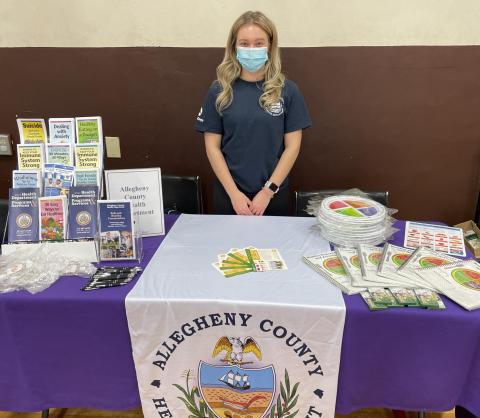So far, my service term at the Allegheny County Health Department’s Chronic Disease and Injury Prevention program has allowed me to expand my knowledge about what exactly goes into chronic disease prevention. I have learned a great amount about nutrition-related policy, the social determinants of health, and equity in access.
Chronic disease is an umbrella term to describe a group of illnesses that persist over time, can gradually progress, and may not be cured. There is tremendous variation in the diseases that are included under this umbrella term, but some of the diseases that are included in the shared language are heart disease, cancer, stroke, and diabetes. According to the USDA, food insecurity is the “household-level economic and social condition of limited or uncertain access to adequate food”. There are a multitude of factors that come into play when analyzing the relationship between food security and chronic disease, though ultimately, achieving high food security will help contribute to lower rates of chronic disease. A few of the chronic diseases that are associated with food insecurity include obesity, hypertension, and diabetes. These people experience nutrition-related chronic diseases as a result of significantly lower access to fresh fruits and vegetables and overall healthy foods. Analysis from a USDA National Health Interview Survey indicated that the number of chronic conditions for adults in food-insecure households was, on average, 18% higher than those in food-secure households. In addition, food security status is strongly related to the number of chronic conditions experienced. Therefore, the lower a person’s food security, the higher probability of developing multiple chronic conditions.
In Pittsburgh, the food insecurity rates are higher than the national average. Various neighborhoods in Pittsburgh are considered food deserts. To combat this, there are a variety of groups and non-profits in the area that work to fight hunger. Two examples of these are 412 Food Rescue, and the Greater Pittsburgh Community Food Bank. There are also smaller initiatives like the Millvale Free Fridge. The Millvale Free fridge partners with different organizations and accepts donations to stock the fridge and provide proteins, vegetables, fruits and full meals completely free to those in need.
In order to lower the amount of chronic conditions experienced, we need to work on achieving health equity. It all comes down to access. All people need to be given the unique and necessary support to allow equal access to resources. In my work at the Allegheny County Health Department, I participate in achieving health equity by creating policy initiatives to increase access to healthy foods and beverages in schools throughout Allegheny County. I also participate in various outreach/community events where I provide all community members with any nutrition related resources they need - ranging from how to prepare vegetables and appropriate serving sizes to handing out free coupons and information about the fresh markets.


